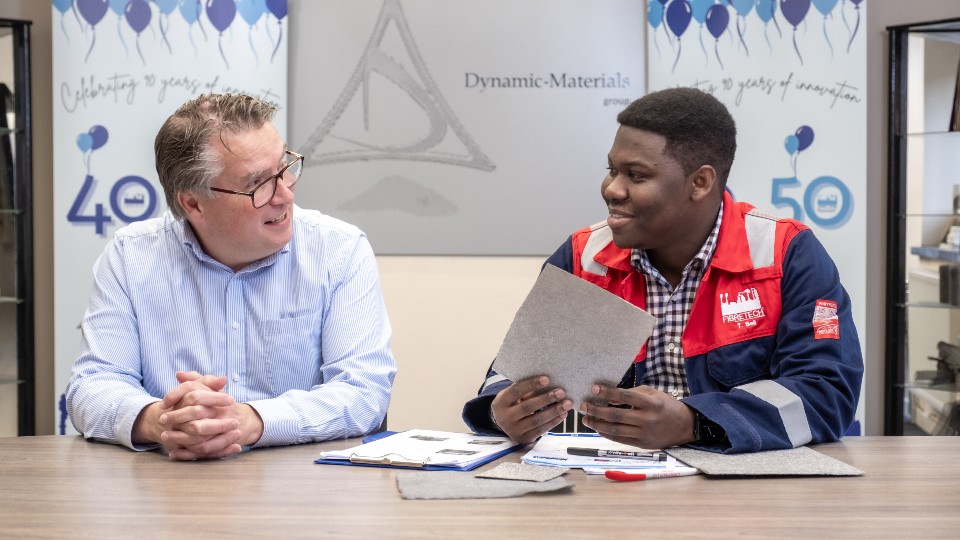KEF plays a key role in providing unique and important public information on the rich and diverse ways English universities continue to engage with society and our economy, locally, nationally, and internationally.
It groups institutions into ‘clusters’ of peers – institutions with similar characteristics such as how much research they do and in what subject areas. Loughborough University is in a cluster comprising large, high research intensive and broad-discipline universities undertaking a significant amount of excellent research.
KEF4, released on Wednesday 18 September, shows Loughborough was awarded the highest possible grade – quintile 5, classed as ‘very high engagement’ – for categories including Working with business, Working with public and third sector, and Intellectual Property (IP) and commercialisation.
Notable highlights in these areas include:
Working with business:
An Innovate UK Knowledge Transfer Project with Fibre Technology, is developing Electrode Materials for Integrated Battery-Electrolyser Systems. Sadiq Abdullahi, pictured above with Technology Manager Lee Marston, has already achieved exceptional results in this project that aims to open up exciting possibilities for low-cost green hydrogen production using flow batteries.
The Fibre Technology collaboration builds on Loughborough’s established track record of working with businesses in the cleantech sector. More than 60 industry and civic partners are engaged in EnerHy, the UK’s only green hydrogen Centre for Doctoral Training, funded by the Engineering and Physical Science Council and led by Loughborough in partnership with Cranfield University and the University of Strathclyde, announced earlier this year.
Working with public and third sector:
In the UK, adults with learning difficulties and multiple long-term health conditions life expectancy is shorter, and about 38% of them die from an avoidable cause. Loughborough University and the Leicestershire Partnership NHS lead a major project funded by the National Institute for Health Research which applies Artificial Intelligence to design better healthcare outcomes in what is a very complex system of care and intervention.
Earlier this year, the University’s Climate Compatible Growth (CCG) programme, which is part of STEER (the Sustainable Transitions: Energy, Environment and Resilience Centre), received a £57 million boost from the UK Government, building on its initial £38 million award and extending the programme to 2030.
The team’s work is driving transformative and innovative approaches that unlock finance and promote investment in electricity networks, grid decarbonisation and low carbon transport. The extension will provide more countries across sub-Saharan Africa and Asia with the UK expertise needed to support improved, climate resilient infrastructure.
IP & commercialisation:
Aftrak is an innovative microgrid solution that integrates energy access with 100% renewable electric agriculture and deep bed farming to boost crop yield, income and ensure sustainable electricity for millions of African smallholder farmers and their communities. Invented and manufactured at the University in partnership with the Consortium for Battery Innovation and Tiyeni, the solution has accelerated from initial concept to successful trial in less than 18 months.
Since winning the $1M Milken-Motsepe Green Energy Prize in May this year, a limited company is being established further develop and deploy the solution across Malawi where 89% of the population is without electricity access.
Speaking about Loughborough’s success in KEF4, Professor Dan Parsons, the University’s Pro Vice-Chancellor for Research and Innovation, said: "I am once again absolutely delighted by these fantastic results that demonstrate the extent, reach and significance of our knowledge exchange activity at Loughborough University and am particularly proud of the recognition concerning our working with business and our IP and commercialisation activities.
"The dedication and hard work of our staff, students and partners is key to the outcomes surfaced in these results. Our fusion of research and innovation into one ecosystem helps drive and support the collaborations and partnerships that underpin these results and ensure that our work makes real world differences that impacts society in positive and sustainable ways into the future.”
